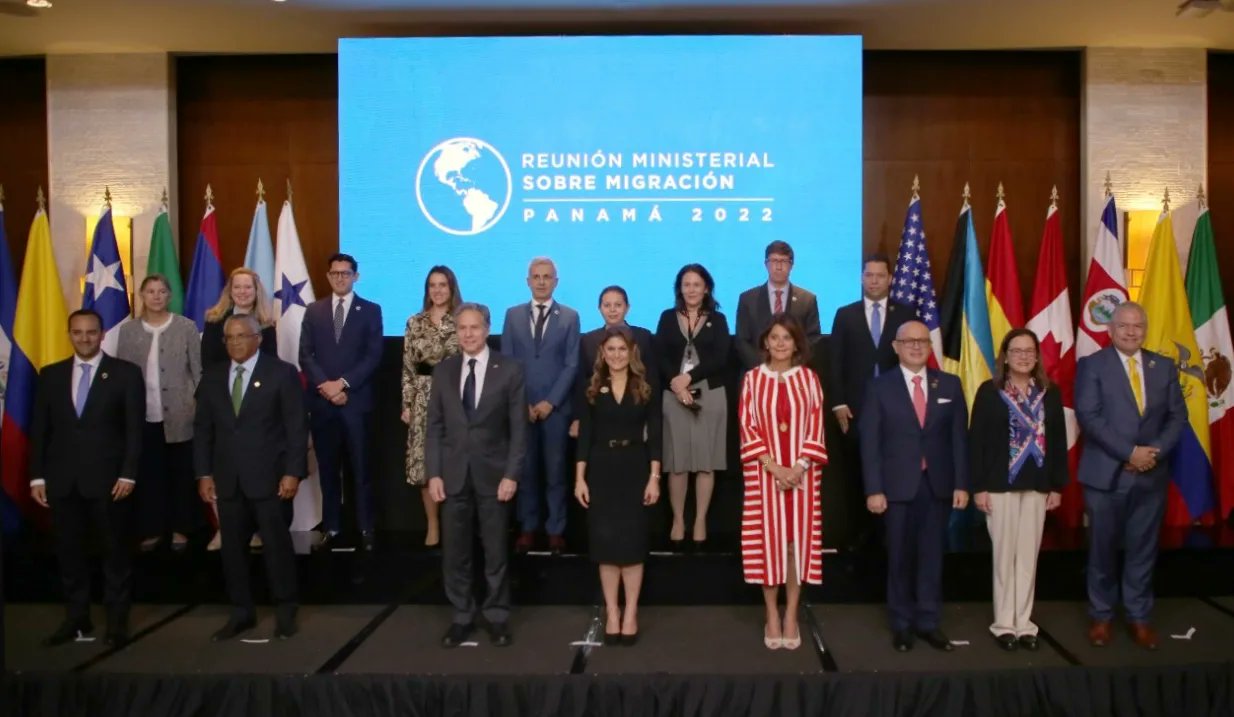
In Panama-hosted summit, regional leaders agree to address irregular migration with enhanced coordination mechanisms to standardize migration policies
The Ministerial Meeting on Migration convened by Panama concluded today with the consolidation of a new regional framework to address migratory flows at the regional level, closing a summit that featured the participation of foreign ministers, security ministers, and migration authorities from countries across North and South America.
“We have focused strategically on this issue in a coordinated manner, acting immediately and decisively facing the challenge because we understand that words are not enough in the face of a problem of this magnitude”, Panama’s President Laurentino Cortizo Cohen said in an address to the meeting’s participants.
The President reaffirmed the commitment of the Republic of Panama to work in collaboration with partner countries as strategic allies in the search for joint solutions, transnational policies, and concrete actions that promote regular, orderly, and safe passage for migrants while respecting human rights. In addition, the Panamanian president thanked those present “for their participation, willingness and determination to work on regional integration to address the irregular migratory phenomenon in the context of international migration.”
The participating countries agreed to establish a framework led by the foreign ministers to coordinate the standardization of regional migration policies, as well as to promote cooperation between countries, intergovernmental organizations, development banks, and international aid funds to address the high migration flows – and the root causes of migration – in an orderly, safe and humanitarian manner.
“This framework offers a clear roadmap, concrete milestones and goals, and the policies that we must implement in a way that ensures the well-being of the people who transit through our countries and the stability of the communities that receive them,” Panama’s Foreign Minister Erika Mouynes said about the agreement.
Minister Mouynes explained that, after the first regional ministerial meeting on migration convened by Panama in August last year, which catalyzed follow-up engagements at the technical and diplomatic levels, this meeting achieved “unprecedented progress and the institutional and multilateral framework required for the region to guarantee a sustainable and humanitarian response to high transcontinental migration flows.”
In addition, the need for greater financing for origin, transit, and destination countries affected by migration was highlighted during the meeting.
“Addressing the phenomenon of irregular migration is a priority on our agendas and we have committed to doing it together. That is the great triumph of this meeting”, concluded the Panamanian Foreign Minister.
The foreign and security ministers meeting in Panama agreed on the need to combat human trafficking and cartels that promote misinformation and endanger the safety of the migrants who are victims of cross-border trafficking networks.
“We are determined to ensure the application of international humanitarian law and to dismantle, as we have done so far, the organized crime networks that take advantage of the hopes of thousands of men, women, and children in search of better opportunities,” the ministers declared in their statements.
At the meeting, which also brought together the International Organization for Migration, the Red Cross, and international funding agencies, the following three priority areas were identified:
- The stabilization and post-pandemic recovery of migrant reception communities.
- Addressing the root causes of migration, including infrastructure development and basic needs, in the countries of origin as a mechanism to discourage irregular migratory flows.
- The recognition of co-responsibility between the countries of origin, transit, and destination in addressing irregular migration.
“With today’s results, the path is paved to generate new opportunities and guide the region towards development that gradually changes the conditions which force these massive displacements,” the minister concluded at the meeting.
As the next step in the Panamanian diplomatic strategy, Foreign Minister Mouynes announced the next meeting, also hosted by Panama, of the ministers of Central America and the Caribbean, to develop an ambitious regional proposal that addresses the economic and political impacts of the current geopolitical environment, which will also affect migratory movements.
This meeting, scheduled for May 3, will be attended by Josep Borrell, High Representative of the European Union for Foreign Affairs and Security Policy and Vice President of the European Commission, a bloc with which Panama continues to strengthen collaboration and bilateral ties.
During the meeting, the immigration figures registered in the Darien Gap, between the border of Colombia and Panama, were shared, with peaks of up to 2,800 people a day in 2021. More than 130,000 migrants of 35 different nationalities crossed through the Darien last year.
Panama is often the first country on the migration route that offers shelter, food, and medical attention to irregular migrants and is also often the first to apply biometric controls to identify those with international criminal records.
In an average year, 8,000 irregular migrants cross Panama. In 2021, the figure rose to more than 130,000 and so far in 2022, the number exceeds 15,000.
Read in Spanish here.